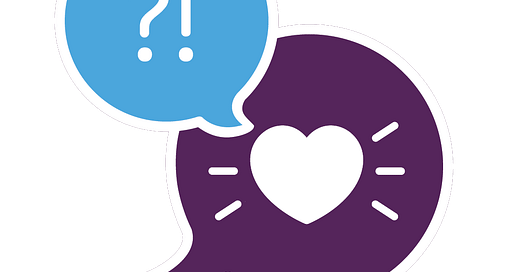If you’re reading this, you probably know me from Pivotal (RIP) or Cloud Foundry or VMware or Olin or just randomly meeting somewhere.
If you don’t know me, hi! I’m Molly and I run Crowther Healthcare Advocacy (I’m the Crowther). This newsletter-type-thing is mostly going to be about work and things that interest me in the healthcare realm, so that’s how I’ll introduce myself. I used to work in tech, and before that I used to study systems design. After spending 5+ years as a Technical Program Manager (TPM) at Pivotal (RIP) and VMware, I decided for various reasons to get out of the software game and pivot (RIP) to doing some of the same things but in a healthcare context. Some of those parallels might not seem clear at first, but that’s one of the topics I’m going to dive further into each month. And of course, you can look forward to my signature hot takes and (cool) gifs.
What is healthcare advocacy?
I usually find myself describing healthcare advocacy as how it relates to the failure of the current US medical system. Because of various complicated factors that I’m only beginning to understand, the medical system isn’t providing things that people really need, like:
someone who can spend more than 15 minutes with them to understand what they’re experiencing.
providers who aren’t incentivized to give up when they have complex symptoms.
a guide to walk them through both medical care and insurance from a high level.
Obviously there are other extremely major issues with our healthcare system, but at the moment I’m interested most in learning about the system and guiding people through it (and not trying to fix the whole thing myself for once).
Healthcare advocates, also sometimes known as patient advocates, are starting to provide this compass that individuals and families need to navigate the healthcare system. Some work for hospitals or insurers, and some have independent practices like me.
How a healthcare advocate is kind of like a TPM
Early in 2021, I was scanning my local University of California’s Extension course list. As soon as I saw their healthcare advocacy program I could immediately see the parallels with my work as a technical program manager, like:
listening and understanding a situation from the context of a larger system that others can’t always see.
exploring the solution space and aiding in decision-making.
helping other people get things done effectively by identifying and removing obstacles like communication barriers.
Fortunately, as a TPM I spent a lot of time explaining to people what TPMs are and why they’re valuable; the healthcare advocate value proposition seems much more understandable to most people. After a minute or so they’re like “wow that’s so important and people definitely need that”, whereas with TPM it was usually like “yeah sure okay but I need proof”.
I’m hoping to bring some collaborative tools like Miro and liberating structures to the healthcare advocacy space. I’ll be writing more about that in future months so stay tuned.
Business thought™ of the month
After a year and a half of the pandemic and trying to do a very complex, relationship-driven job completely remotely, I decided to quit and try going to school and setting up my own business. I’m not trying to grow fast, especially right now while I’m still in school, but here’s one of those aforementioned hot takes.
I *hate* OKRs
One of the things I live about working for myself is that I don’t have to spend time implementing OKRs anymore. Going back to the beginning of time, managers have always liked to talk about OKRs (objectives and key results) or KPIs (key performance indicators) or whatever thing they invented in ancient Rome that is supposed to help teams get things done but actually just gets in the way of them getting said things done. OKRs in particular were always a sticking point for me - so much time was spent arguing about what they should be like that, again, it was hard to get anything done.
One thing I hate about OKRs is that most people agree on about OKRs is that they are goals you’re not actually supposed to meet!
OKRs are literally psychological torture. If you' only hit 70% of the goal you’re supposed to feel good about your progress (but you don’t, because it’s a C-!), but if you hit 100% you’re supposed to feel bad because the goal was too easy. I never set goals for myself that way. It’s so much more more motivating and less COMPLETELY BONKERS to set an easy goal that I’m likely to achieve. There is no excuse if it doesn’t get done. If the goal is too easy and I go above and beyond I get to feel extra good, not vaguely still terrible!
One of the goals I have set for the first quarter is to do 5 free consultations (up from 3 last quarter). In these consultations I talk to potential clients about what healthcare-related issue they are struggling with, and we figure out if I might be able to help. The feedback I’ve gotten from folks so far is that it’s helpful to have a neutral third party looking at everything from a higher level. This is your call to action! If you’re still reading and want to help me reach my goal for this quarter, book some time with me.
Thank you!
Thanks for reading! I hope you come back again. Feel free to leave me a comment or shoot me an email at molly@crowther.care any time. See you next month!








This is terrific, Molly. What I love is the way you creatively transfer your tech-grounded skills to solving an entirely different and incredibly challenging set of problems. Keep up the great writing! /Pamela | Spark Health Navigation